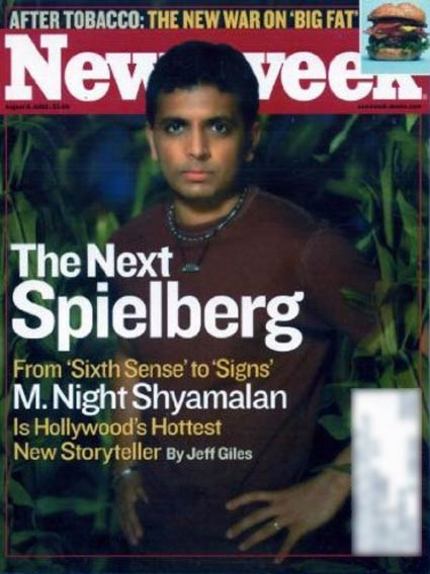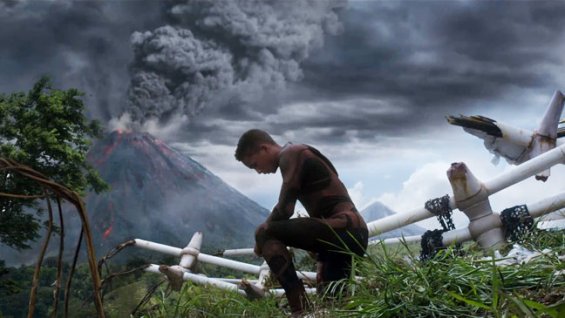Counterpoint Review: AFTER EARTH May Not Be So Apocalyptically Bad After All

Back then, few would have guessed that Shyamalan's career would very soon go the way of Newsweek itself - a pale, embarrassing blip in the shadow of its former self. The once-hot auteur's filmography went into sharp decline starting with his very next film, The Village (2004), and continued to plummet into a self-made apocalypse with abysmal work such as The Happening (2008) and The Last Airbender (2010). But coasting on the undeniable quality of The Sixth Sense (1999), Unbreakable (2000), and Signs, he's managed to keep working, even as the world he once laid claim to abandoned him for destroying it.
And so, Shyamalan's world ended a long time ago. Now it's After Earth, and with it, the filmmaker finally has a bona fide interstellar adventure on his resume. My colleague Jason Gorber was, to say the least, not satisfied with the film, writing in part:
And so, Shyamalan's world ended a long time ago. Now it's After Earth, and with it, the filmmaker finally has a bona fide interstellar adventure on his resume. My colleague Jason Gorber was, to say the least, not satisfied with the film, writing in part:
It's a film that reminds you of sitting in a waiting room, a dull, non-kitschy kind of boredom. This isn't cool bad, or funny bad, or kitschy bad. No, this is just bad bad, and that's really not so much fun.
My reaction was quite a bit different. In order to explain, first let's detail the story a bit more.
In true Shyamalan fashion, the scope of the story is decidedly earthbound. More than 1,000 years in the future, our planet has been deserted by mankind; forsaken as a dangerous place. But is this Earth any more dangerous than the one we know? In the story (conjured by star Will Smith), an armed forces carrier ship goes down on the verboten planet, leaving Smith's character Cypher (a no-nonsense military higher-up) and his adolescent son Kitai (played by Smith's real life son, Jaden) the only survivors. With Cypher injured, Kitai must venture out on his own on a mission that means their very survival. But what's set up as a classic Man versus Nature scenario is quickly revealed to be a jungle-bound Teen versus Inner Fears scenario; a Campbellian heroes journey to the core.
On his solo adventure into the big scary world, Kitai must face harsh terrain and all manner of hungry wild beasts. (His color changing mood ring-like unitard reflects his own state.) He's also working against the clock, and his ship's deadly living cargo might just be out there somewhere. An inhaler is involved, as is dad's fading pain threshold. Global warning has apparently given way to daily frigid global cooling, but nothing so drastic that all manner of wild critter can't survive. (Some of which are downright Cenozoic in their evolutionary variation.) In its opening minutes, After Earth does point the finger of blame for the planet's fate directly at us - a heavy indictment that makes for a dour tone, something unconventional for a big summer tent pole movie. (Indeed, the film is slower paced than one might expect for this time of year, but never boring.)
But beyond the early feel-bad stock footage flashbacks of oil refineries and pollution, we find what is perhaps Shyamalan's most authentically personal statement to date, apart from even his early "auteur" masterpieces. While those films may remain superior to After Earth, they nonetheless wear their artistry in a boisterous, show-offy way. (If the director has a cameo in this film, it's certainly not in keeping with his past egocentric appearances.) This is a more humble, quieter Shyamalan, seemingly reeling from self-inflicted deflation. It just so happens that his return to legitimate, watchable artistry is also the latest page in Will Smith's family album. (Which is shaping up to be one VERY expensive chronicle!)
Will Smith has been gravitating from his "Fresh Prince" personality driven stardom to onscreen dad, sometimes bringing his family members along for good measure. (A side result has been the budding film career of son Jaden, who also stared with his dad in The Pursuit of Happyness (2006) and carried The Karate Kid remake in 2010.) While some may find this narcissistic, grating, or opportunistic, After Earth makes it work. This time, Jaden actually takes the spotlight, continuing his own perceived nepotistic rise, whether we like it or not.
Kitai is emotionally damaged from an earlier-life trauma that claimed a family member. Graduating from cadet to full-blown ranger in military school seems to him the only way to prove himself to his tough-as-nails top brass dad. But there's never any doubt that dad knows what's best for his boy. After a clichéd course-correcting moment of early encouragement from his wife (an on-and-gone Sophie Okenedo), Cypher's balancing act between caring father and capable commander is established. (Don't believe this woman is wise? Look no further than her symbolic tree root-print blouse.)
Smith as Cypher is stoic, hard-edged, but never cold. His performance is downright revelatory of his capabilities as an actor. (Versus merely serving up yet another variation on his established persona.) Although he is injured and ship bound for most of the film, he never fails to impress in his blend of serviceman's steadfastness and paternal guidance. By being the stern but loving authoritative voice in is son's ear (Cypher navigates Kitai via wrist communicator that Under No Circumstances Must Be Lost Or Damaged! Which is the screenplay's way of letting us know it's only a matter of time until the thing's toast), he is able to turn him loose into the brutal world to ultimately make his own life and death choices. That makes After Earth an every-parents tale, although from Kitai's perspective it transcends that, becoming an inner faith-finding excursion. Cypher has instructed Kitai to hold his own, but when it comes down to it, the order to "take a knee" (kneel) in meditative humility is never far off.
 I believe it was in the aforementioned Newsweek piece that the filmmaker detailed his practice of rotating out the three movie posters that adorn his office walls based upon whatever he needed to tonally and thematically inspire him for his next go-round. For Signs, he might've put up posters for the original War of the Worlds, or perhaps The Silence of the Lambs. For his new effort, After Earth, I can imagine a selection of The Road to Perdition, The Andromeda Strain and the 1925 version of The Lost World. But prior to seeing the film, I wondered if maybe it would have to be all Will Smith posters, as the question of true After Earth creative ownership seemed apparent. (After all of Shyamlan's failings, would Smith be completely willing to let the director direct?) But the film strikes a balance between blatant movie star vehicle and certifiable auteur entry the way Tom Cruise's Mission: Impossible series has commendably done.
I believe it was in the aforementioned Newsweek piece that the filmmaker detailed his practice of rotating out the three movie posters that adorn his office walls based upon whatever he needed to tonally and thematically inspire him for his next go-round. For Signs, he might've put up posters for the original War of the Worlds, or perhaps The Silence of the Lambs. For his new effort, After Earth, I can imagine a selection of The Road to Perdition, The Andromeda Strain and the 1925 version of The Lost World. But prior to seeing the film, I wondered if maybe it would have to be all Will Smith posters, as the question of true After Earth creative ownership seemed apparent. (After all of Shyamlan's failings, would Smith be completely willing to let the director direct?) But the film strikes a balance between blatant movie star vehicle and certifiable auteur entry the way Tom Cruise's Mission: Impossible series has commendably done.
Will Smith may have dreamed up the story of After Earth as a showcase adventure for his son, but through its somber vibe and almost confessional undercurrent, Shyamalan (no longer "Shyamalamadingdong," so just stop saying it already) stealthily makes it his own. After Earth is quite by-the-numbers in many aspects, but it has a good deal of heart, an astonishing performance by Will Smith (even if he never leaves the ship), and is plausible, decently uncomplicated, and completely proficient. It is the director's first good movie in 11 years, and also the best 2013 summer contender to date. He may never be "the next Spielberg," but perhaps this signals that the auteur's world isn't so far gone after all.
After Earth is now playing in theaters across North America.
After Earth
Director(s)
- M. Night Shyamalan
Writer(s)
- Gary Whitta (screenplay)
- M. Night Shyamalan (screenplay)
- Will Smith (story)
Cast
- Jaden Smith
- Will Smith
- Sophie Okonedo
- Zoë Kravitz

Do you feel this content is inappropriate or infringes upon your rights? Click here to report it, or see our DMCA policy.






